人教版英语八年级上册 Unit 1 Where did you go on vacation? Section B 3a-Selfcheck 课件(共30张PPT)
文档属性
| 名称 | 人教版英语八年级上册 Unit 1 Where did you go on vacation? Section B 3a-Selfcheck 课件(共30张PPT) | 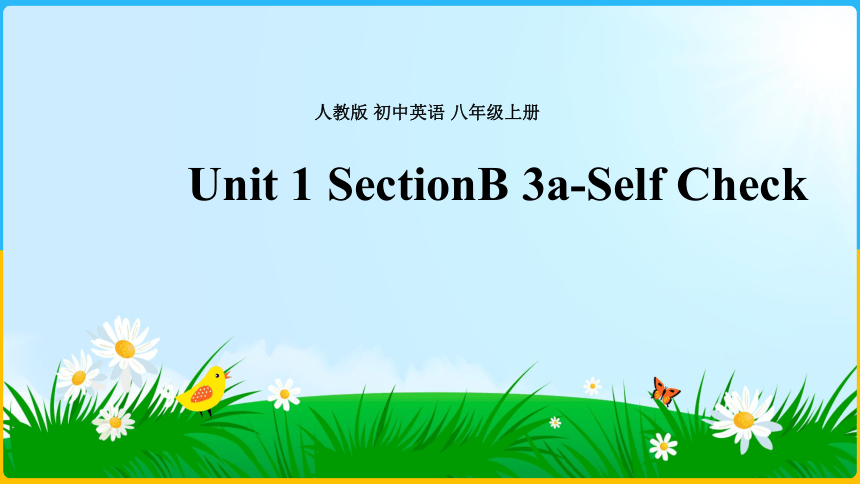 | |
| 格式 | pptx | ||
| 文件大小 | 1.5MB | ||
| 资源类型 | 教案 | ||
| 版本资源 | 人教新目标(Go for it)版 | ||
| 科目 | 英语 | ||
| 更新时间 | 2023-08-19 11:26:45 | ||
图片预览

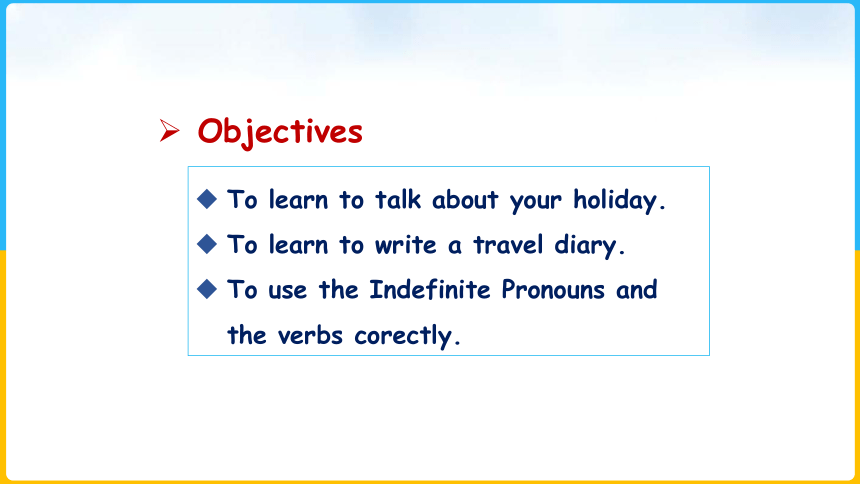
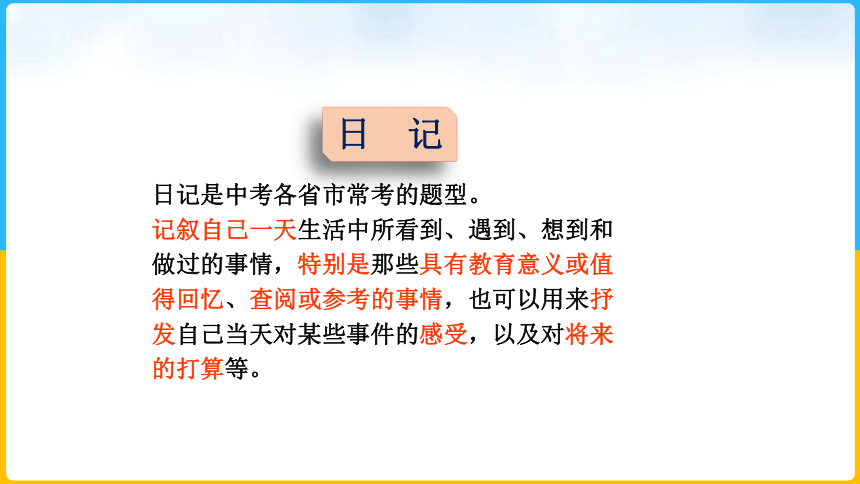
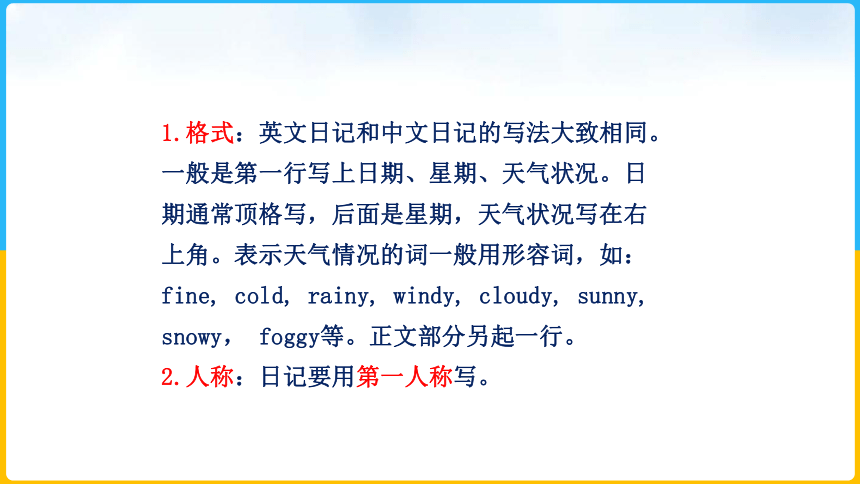
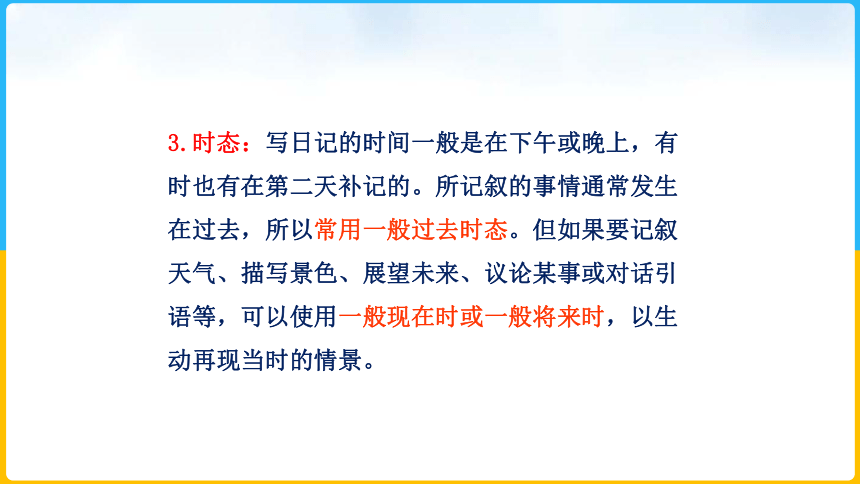
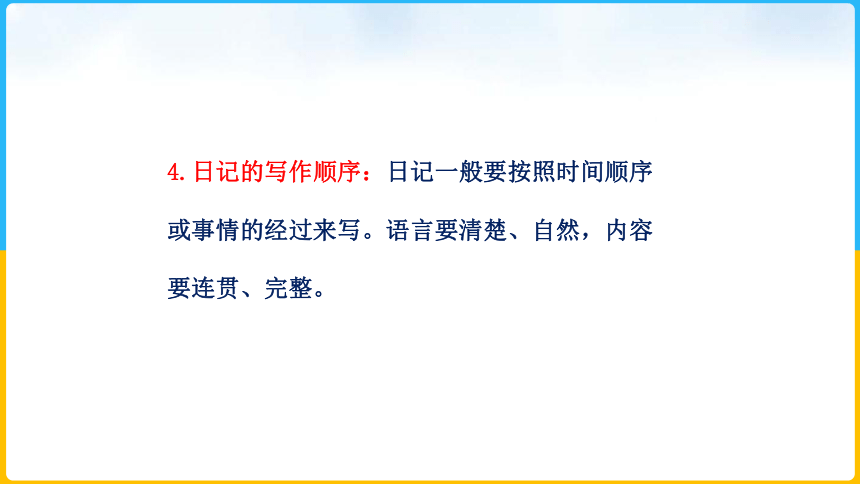


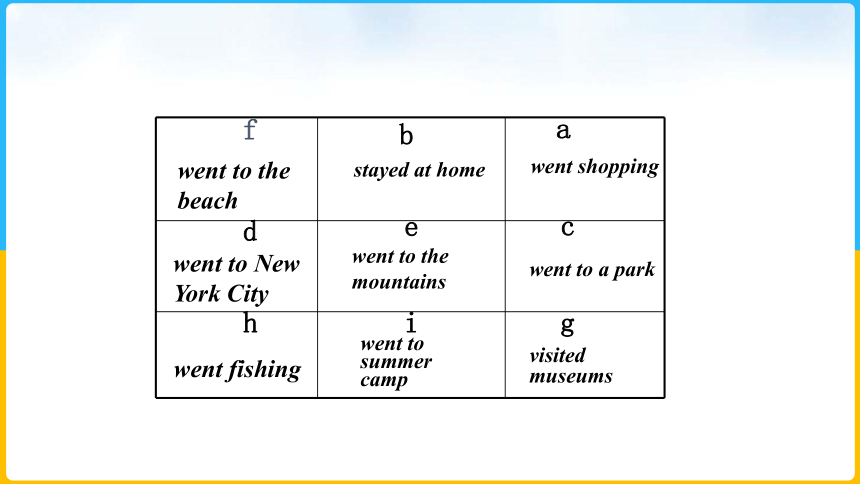
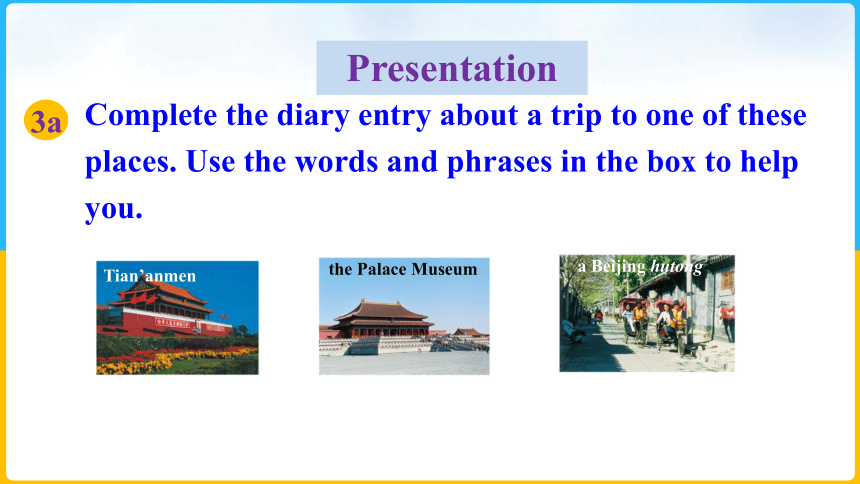
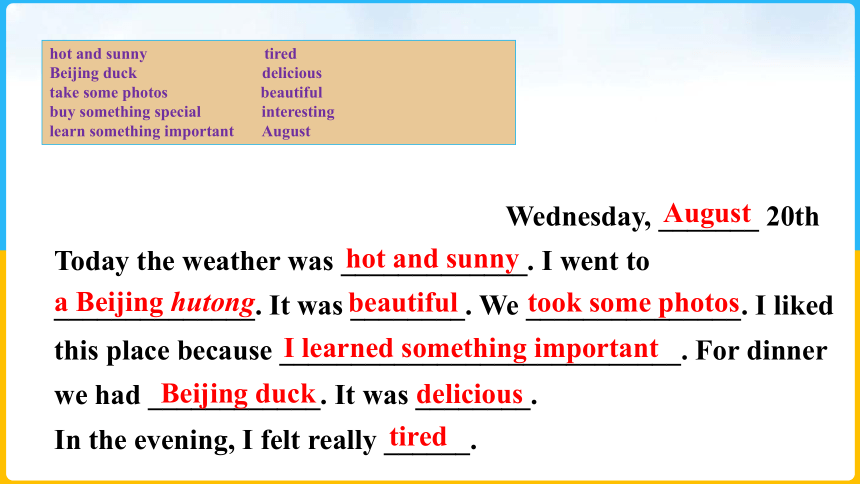
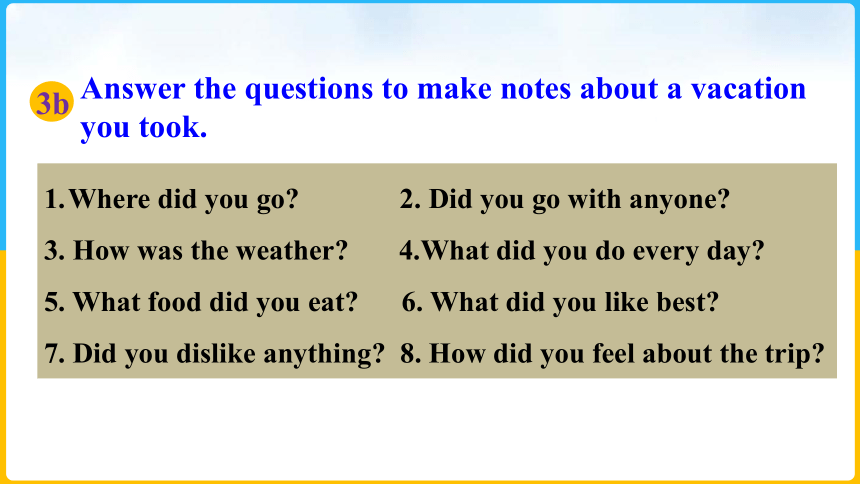
文档简介
(共30张PPT)
人教版 初中英语 八年级上册
Unit 1 SectionB 3a-Self Check
To learn to talk about your holiday.
To learn to write a travel diary.
To use the Indefinite Pronouns and the verbs corectly.
Objectives
日记是中考各省市常考的题型。
记叙自己一天生活中所看到、遇到、想到和做过的事情,特别是那些具有教育意义或值得回忆、查阅或参考的事情,也可以用来抒发自己当天对某些事件的感受,以及对将来的打算等。
日 记
1.格式:英文日记和中文日记的写法大致相同。一般是第一行写上日期、星期、天气状况。日期通常顶格写,后面是星期,天气状况写在右上角。表示天气情况的词一般用形容词,如:fine, cold, rainy, windy, cloudy, sunny, snowy, foggy等。正文部分另起一行。
2.人称:日记要用第一人称写。
3.时态:写日记的时间一般是在下午或晚上,有时也有在第二天补记的。所记叙的事情通常发生在过去,所以常用一般过去时态。但如果要记叙天气、描写景色、展望未来、议论某事或对话引语等,可以使用一般现在时或一般将来时,以生动再现当时的情景。
4.日记的写作顺序:日记一般要按照时间顺序或事情的经过来写。语言要清楚、自然,内容要连贯、完整。
Memory Game
记忆游戏
Did they ...
went to the beach
stayed at home
went shopping
went to New York City
went to the mountains
went to a park
went fishing
went to summer camp
visited museums
f
b
a
d
e
c
h
i
g
Presentation
Complete the diary entry about a trip to one of these places. Use the words and phrases in the box to help you.
3a
a Beijing hutong
Tian’anmen
the Palace Museum
a Beijing hutong
hot and sunny tired
Beijing duck delicious
take some photos beautiful
buy something special interesting
learn something important August
Wednesday, _______ 20th
Today the weather was _____________. I went to ______________. It was ________. We _______________. I liked this place because ____________________________. For dinner we had ____________. It was ________.
In the evening, I felt really ______.
hot and sunny
August
beautiful
a Beijing hutong
took some photos
I learned something important
Beijing duck
delicious
tired
3b
Answer the questions to make notes about a vacation you took.
Where did you go 2. Did you go with anyone
3. How was the weather 4.What did you do every day
5. What food did you eat 6. What did you like best
7. Did you dislike anything 8. How did you feel about the trip
3c
Write a travel diary like Jane’s on page 5. Use your notes in 3b.
______________________________
______________________________
______________________________
______________________________
______________________________
Diary
日记是属于记叙文性质的应用文,是将一天所经历的主要事情和过程依次简要的记下来。日记可以记叙自己一天生活中做过的、看到的、遇到的、想到的和听到的事情,可以记事,可以写人,可以状物,可以写景,也可以记述活动。
Pre-writing
Diary
另起一行。正文可以顶格写,也可以内缩3至5个字母的空间。
格式
书端
正文
位置:第一行
一般写上日期、星期和天气状况。
顺序:月→日→年
表示天气情况的词一般用形容词,写在日期之后,用逗号隔开。
June 18th 2020
sunny, fine, rainy, windy, snowy, cloudy...
顺序:星期在前,月日在后
Monday, June 18th
日记多是在当天晚上记述当天发生过的事情,所以常用一般过去时。但也可以根据具体情况,用其他时态。如记叙天气、描写景色时可以用现在时,发表感想或评论时可用现在或将来时。
人称
日记多是亲身经历和耳闻目睹的事情,所以常用第一人称。
时态
日记一般按照时间顺序或事情的经过来写,要简明扼要,条理清楚,有连贯性,写出真实感。
注意事项
Diary
Framework (结构)
Diary
My travel
Beginning
Main body
Ending
time
place
weather
feelings
partner
activities
We did
We ate
We thought
We enjoyed
...
We saw/heard
feelings
There are a lot of old and special buildings in it. They were so beautiful that I took quite a few photos. And I heard many interesting stories of old China. They helped me learn something important, such as the culture(文化), the history. When I walked around the museum, I wonder what life was like here in the past. For dinner, we had Beijing duck. Although it was very delicious, I didn’t eat too much. That was because I don’t want to be fat.
Wednesday, August 20th
I went to the Palace Museum with my family today. The weather was hot and sunny.
What a wonderful day! All of us felt tired but really happy.
Ending
Beginning
Main body
Tips for your writing
Good sentences
Good phrases
Good words
Good language
(语言)
Correct tense (时态)
Spelling words(单词拼写)
Punctuations(标点符号)
Correct grammar
(语法)
rich content and
complete frame
(内容丰富结构完整)
Content and frame
(内容和结构)
Good handwriting
(书写)
Clean and neat (干净整洁)
Tips
4
Imagine you are all foreigners on vacation in China. You meet each other at the airport on your way home. Talk about what you did on your vacation.
I went to Nanjing.
Hi, my name’s Paul.
Hi, Paul. I’m Anna. Where did you go on vacation
Oh, I went to Beijing. Did you do anything special in Nanjing
Self Check
1 Complete the conversations with the correct words in
the box.
A: Did go on vacation with you last month
B: Yes, my family went to the countryside with me.
2. A: Did your family go to the beach with you last weekend
anything everything nothing anyone everyone no one
anyone
B: No. _______ from my family went, but my friend went
with me.
3. A: I didn’t bring back anything from Malaysia.
B: ________at all Why not
4. A: Did you buy _________ in the shopping center
B: No, I didn’t.___________was very expensive.
5. A: How was the volleyball game yesterday
B: Great! __________had a fun time!
No one
Nothing
anything
Everything
Everyone
2 Complete the passage with the correct forms of the verbs in brackets.
Last August, our class ______(do) something very special on our school trip. We _______(go) to Mount Tai. We _______ (start) our trip at 12:00 at night. Everyone in our class _______(take) a bag with some food and water.
did
went
started
took
After three hours, someone looked at the map and _______ (find) out we _______ (be, not) anywhere near the top. My legs _______(be) so tired that I wanted to stop. My classmates_______(tell) me to keep going, so I _______ (go) on.
found
weren’t
were
told
went
At 5:00 a.m., we got to the top! Everyone __________ (jump) up and down in excitement. Twenty minutes later, the sun _______ (start) to come up. It was so beautiful that we _______ (forget) about the last five hours!
jumped
started
forgot
Language points
1. Did you dislike anything
I dislike playing chess, because I am not good at it.
dislike v. & n. 不喜爱(的事物);厌恶(的事物)
Point
(1) dislike在此作动词,其同义词是hate。
I dislike grapes.
Everyone has his likes and dislikes.
(2) dislike也可以作可数名词,意为“不喜爱的事物;厌恶的事物”。
2. My classmates told me to keep going, so I went on.
tell sb. to do sth. 告诉某人做某事。
Point1
其否定形式为tell sb. not to do sth.告诉某人不要做某事。
My teachers always told me to study hard when I was a student.
Keep working hard, and you will succeed.
keep doing sth. 继续/重复做某事.
Point2
keep doing sth. 指一直处于某种状态或持续某个动作。
拓展延伸:keep的其他常见用法:
keep
keep sb./sth. doing sth. 让某人/某物一直做某事
keep sb./sth.+介词短语 让某人/某物处于某个位置
keep sb./sth.+adj. 让某人/某物……处于某种状态
keep+adj. 保持……
Homework
1. Work on your diary entry and make sure
there are no mistakes. Then, write it
down in your exercise book.
2. Do the exercises in students’ book.
人教版 初中英语 八年级上册
非常感谢收看
人教版 初中英语 八年级上册
Unit 1 SectionB 3a-Self Check
To learn to talk about your holiday.
To learn to write a travel diary.
To use the Indefinite Pronouns and the verbs corectly.
Objectives
日记是中考各省市常考的题型。
记叙自己一天生活中所看到、遇到、想到和做过的事情,特别是那些具有教育意义或值得回忆、查阅或参考的事情,也可以用来抒发自己当天对某些事件的感受,以及对将来的打算等。
日 记
1.格式:英文日记和中文日记的写法大致相同。一般是第一行写上日期、星期、天气状况。日期通常顶格写,后面是星期,天气状况写在右上角。表示天气情况的词一般用形容词,如:fine, cold, rainy, windy, cloudy, sunny, snowy, foggy等。正文部分另起一行。
2.人称:日记要用第一人称写。
3.时态:写日记的时间一般是在下午或晚上,有时也有在第二天补记的。所记叙的事情通常发生在过去,所以常用一般过去时态。但如果要记叙天气、描写景色、展望未来、议论某事或对话引语等,可以使用一般现在时或一般将来时,以生动再现当时的情景。
4.日记的写作顺序:日记一般要按照时间顺序或事情的经过来写。语言要清楚、自然,内容要连贯、完整。
Memory Game
记忆游戏
Did they ...
went to the beach
stayed at home
went shopping
went to New York City
went to the mountains
went to a park
went fishing
went to summer camp
visited museums
f
b
a
d
e
c
h
i
g
Presentation
Complete the diary entry about a trip to one of these places. Use the words and phrases in the box to help you.
3a
a Beijing hutong
Tian’anmen
the Palace Museum
a Beijing hutong
hot and sunny tired
Beijing duck delicious
take some photos beautiful
buy something special interesting
learn something important August
Wednesday, _______ 20th
Today the weather was _____________. I went to ______________. It was ________. We _______________. I liked this place because ____________________________. For dinner we had ____________. It was ________.
In the evening, I felt really ______.
hot and sunny
August
beautiful
a Beijing hutong
took some photos
I learned something important
Beijing duck
delicious
tired
3b
Answer the questions to make notes about a vacation you took.
Where did you go 2. Did you go with anyone
3. How was the weather 4.What did you do every day
5. What food did you eat 6. What did you like best
7. Did you dislike anything 8. How did you feel about the trip
3c
Write a travel diary like Jane’s on page 5. Use your notes in 3b.
______________________________
______________________________
______________________________
______________________________
______________________________
Diary
日记是属于记叙文性质的应用文,是将一天所经历的主要事情和过程依次简要的记下来。日记可以记叙自己一天生活中做过的、看到的、遇到的、想到的和听到的事情,可以记事,可以写人,可以状物,可以写景,也可以记述活动。
Pre-writing
Diary
另起一行。正文可以顶格写,也可以内缩3至5个字母的空间。
格式
书端
正文
位置:第一行
一般写上日期、星期和天气状况。
顺序:月→日→年
表示天气情况的词一般用形容词,写在日期之后,用逗号隔开。
June 18th 2020
sunny, fine, rainy, windy, snowy, cloudy...
顺序:星期在前,月日在后
Monday, June 18th
日记多是在当天晚上记述当天发生过的事情,所以常用一般过去时。但也可以根据具体情况,用其他时态。如记叙天气、描写景色时可以用现在时,发表感想或评论时可用现在或将来时。
人称
日记多是亲身经历和耳闻目睹的事情,所以常用第一人称。
时态
日记一般按照时间顺序或事情的经过来写,要简明扼要,条理清楚,有连贯性,写出真实感。
注意事项
Diary
Framework (结构)
Diary
My travel
Beginning
Main body
Ending
time
place
weather
feelings
partner
activities
We did
We ate
We thought
We enjoyed
...
We saw/heard
feelings
There are a lot of old and special buildings in it. They were so beautiful that I took quite a few photos. And I heard many interesting stories of old China. They helped me learn something important, such as the culture(文化), the history. When I walked around the museum, I wonder what life was like here in the past. For dinner, we had Beijing duck. Although it was very delicious, I didn’t eat too much. That was because I don’t want to be fat.
Wednesday, August 20th
I went to the Palace Museum with my family today. The weather was hot and sunny.
What a wonderful day! All of us felt tired but really happy.
Ending
Beginning
Main body
Tips for your writing
Good sentences
Good phrases
Good words
Good language
(语言)
Correct tense (时态)
Spelling words(单词拼写)
Punctuations(标点符号)
Correct grammar
(语法)
rich content and
complete frame
(内容丰富结构完整)
Content and frame
(内容和结构)
Good handwriting
(书写)
Clean and neat (干净整洁)
Tips
4
Imagine you are all foreigners on vacation in China. You meet each other at the airport on your way home. Talk about what you did on your vacation.
I went to Nanjing.
Hi, my name’s Paul.
Hi, Paul. I’m Anna. Where did you go on vacation
Oh, I went to Beijing. Did you do anything special in Nanjing
Self Check
1 Complete the conversations with the correct words in
the box.
A: Did go on vacation with you last month
B: Yes, my family went to the countryside with me.
2. A: Did your family go to the beach with you last weekend
anything everything nothing anyone everyone no one
anyone
B: No. _______ from my family went, but my friend went
with me.
3. A: I didn’t bring back anything from Malaysia.
B: ________at all Why not
4. A: Did you buy _________ in the shopping center
B: No, I didn’t.___________was very expensive.
5. A: How was the volleyball game yesterday
B: Great! __________had a fun time!
No one
Nothing
anything
Everything
Everyone
2 Complete the passage with the correct forms of the verbs in brackets.
Last August, our class ______(do) something very special on our school trip. We _______(go) to Mount Tai. We _______ (start) our trip at 12:00 at night. Everyone in our class _______(take) a bag with some food and water.
did
went
started
took
After three hours, someone looked at the map and _______ (find) out we _______ (be, not) anywhere near the top. My legs _______(be) so tired that I wanted to stop. My classmates_______(tell) me to keep going, so I _______ (go) on.
found
weren’t
were
told
went
At 5:00 a.m., we got to the top! Everyone __________ (jump) up and down in excitement. Twenty minutes later, the sun _______ (start) to come up. It was so beautiful that we _______ (forget) about the last five hours!
jumped
started
forgot
Language points
1. Did you dislike anything
I dislike playing chess, because I am not good at it.
dislike v. & n. 不喜爱(的事物);厌恶(的事物)
Point
(1) dislike在此作动词,其同义词是hate。
I dislike grapes.
Everyone has his likes and dislikes.
(2) dislike也可以作可数名词,意为“不喜爱的事物;厌恶的事物”。
2. My classmates told me to keep going, so I went on.
tell sb. to do sth. 告诉某人做某事。
Point1
其否定形式为tell sb. not to do sth.告诉某人不要做某事。
My teachers always told me to study hard when I was a student.
Keep working hard, and you will succeed.
keep doing sth. 继续/重复做某事.
Point2
keep doing sth. 指一直处于某种状态或持续某个动作。
拓展延伸:keep的其他常见用法:
keep
keep sb./sth. doing sth. 让某人/某物一直做某事
keep sb./sth.+介词短语 让某人/某物处于某个位置
keep sb./sth.+adj. 让某人/某物……处于某种状态
keep+adj. 保持……
Homework
1. Work on your diary entry and make sure
there are no mistakes. Then, write it
down in your exercise book.
2. Do the exercises in students’ book.
人教版 初中英语 八年级上册
非常感谢收看
同课章节目录
- Unit 1 Where did you go on vacation?
- Section A
- Section B
- Unit 2 How often do you exercise?
- Section A
- Section B
- Unit 3 I'm more outgoing than my sister.
- Section A
- Section B
- Unit 4 What's the best movie theater?
- Section A
- Section B
- Unit 5 Do you want to watch a game show?
- Section A
- Section B
- Unit 6 I'm going to study computer science.
- Section A
- Section B
- Unit 7 Will people have robots?
- Section A
- Section B
- Unit 8 How do you make a banana milk shake?
- Section A
- Section B
- Unit 9 Can you come to my party?
- Section A
- Section B
- Unit 10 If you go to the party, you'll have a grea
- Section A
- Section B
